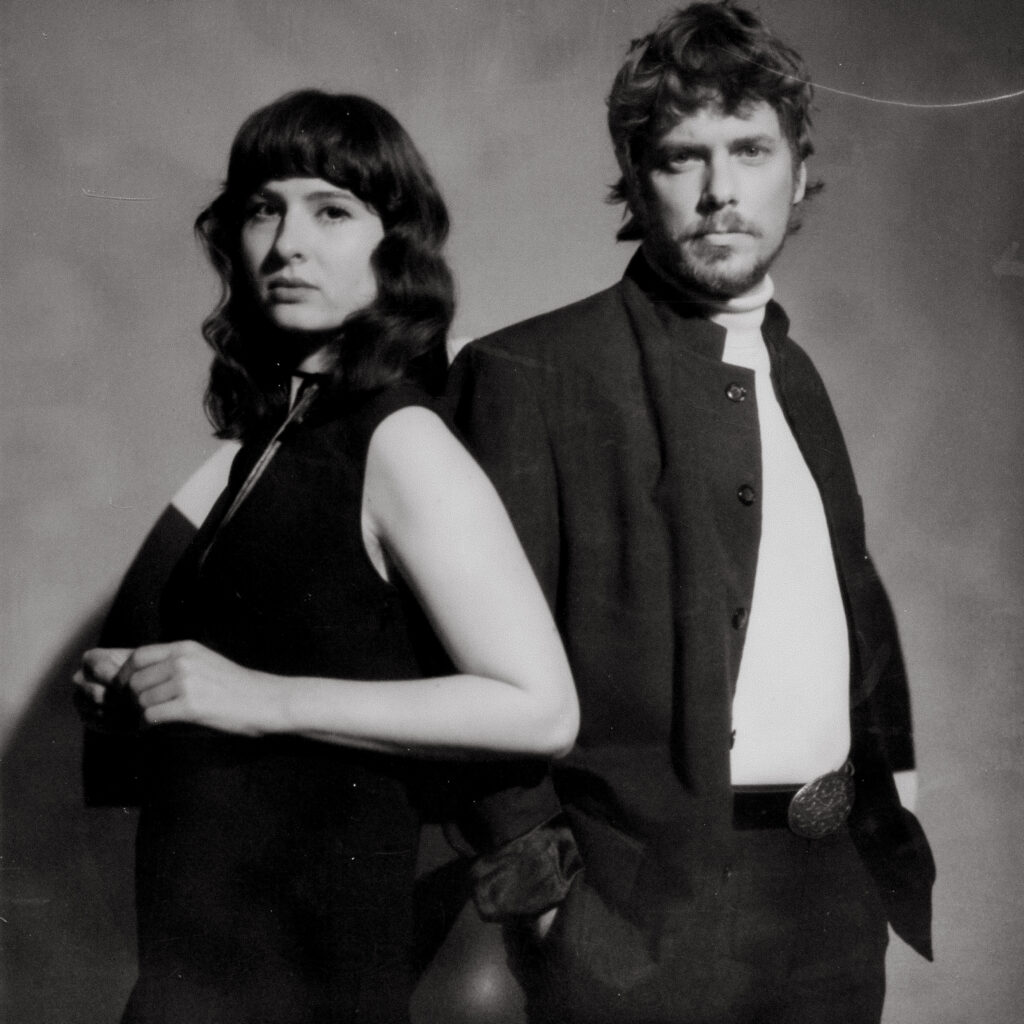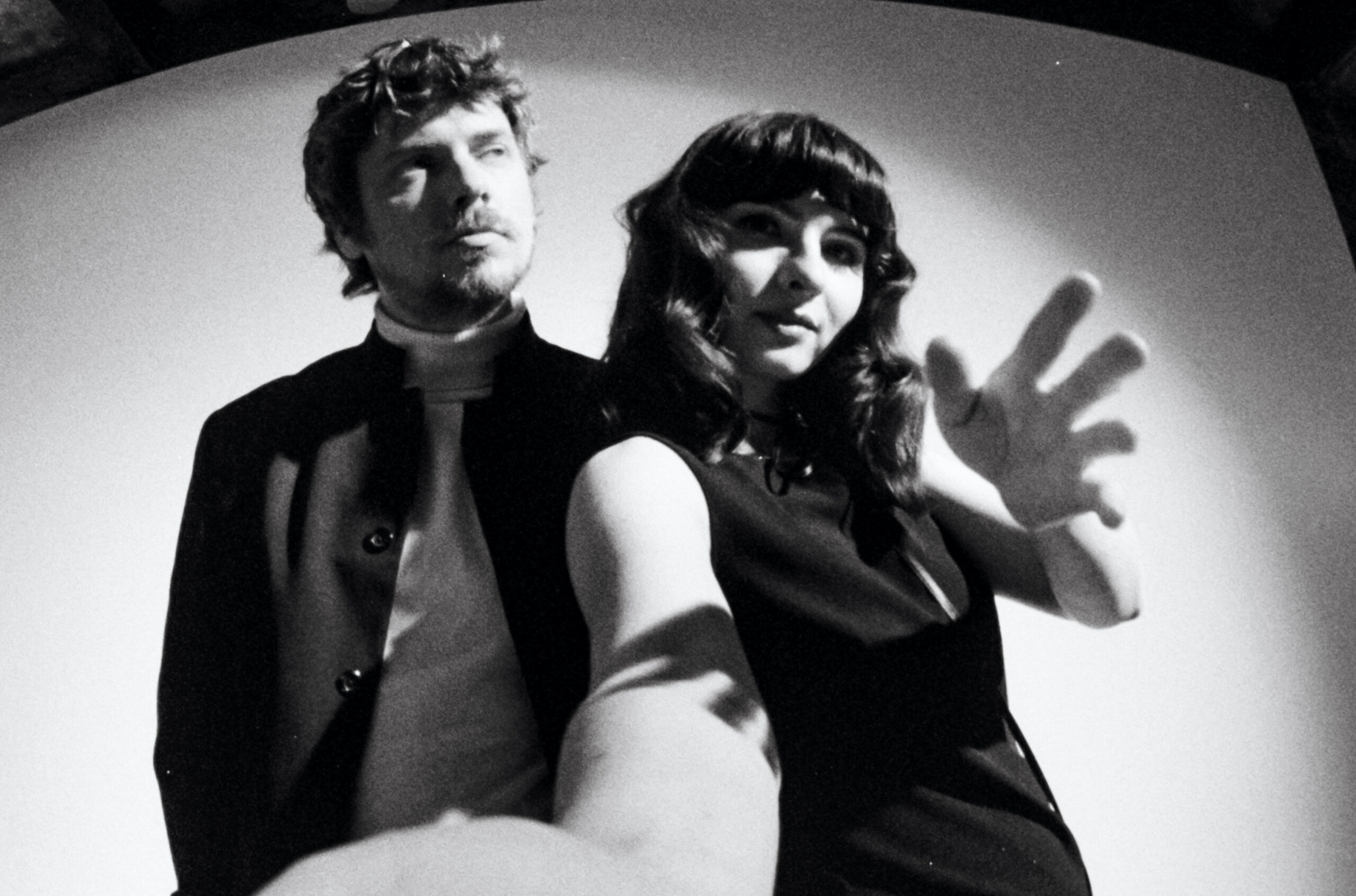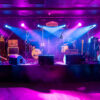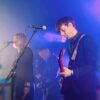Sleek chamber pop duo Donna Blue are musical collaborators and couple Danique van Kesteren and Bart van Dalen from the Netherlands who create chic bilingual English/French 60’s pop fused with psychedelic haze and a dreamy pop noir-romanticism. It’s a sound that leads the way into the bygone world of poets, dreamers, the hazy Côte d’Azur, and old 60’s spy movies. Listen and submerge yourself in their smart, psychedelic timeless elegance. Take yourself on a sonic trip to the 60s and back with Donna Blue.
Counting Elton John amongst their fans, their second album Into The Realm of Love is out next month, followed by an extensive European tour in Spring. So far they have amassed over ten million streams and been played on Elton John’s Beats1 Rocket Hour radio show and on BBC Radio 6 Music. They have played in Austin’s SXSW and at a Paste Session in New York as well as touring Europe. Into The Realm of Love follows their 2022 debut album Dark Roses. In their sophomore album, dreamy vintage romanticism is woven with mythology, the celestial, exotica and noir-romanticism laced with personal songs reflecting their contemporary experiences and a love of 60’s storytelling.
To celebrate the release of their stylish new video, Aphrodite, Donna Blue chatted to GIITTV about their craft and inspirations, the lyrical rhythms of English and French, the importance of listening with your heart and how the sun, moon, and planets move as a form of music and it was so enlightening.
How would you describe your sound to anyone new to Donna Blue?
B: “We usually call it a sixties chamber pop sound. It floats somewhere between Nancy & Lee’s moody western duets and Serge Gainsbourg’s upbeat French hit songs, and we draw inspiration from obscure vintage film soundtracks and psychedelia.“
Where did the name come from?
D: “There is a character in the David Lynch show ‘Twin Peaks’ that is called Donna, we both really love the darkness and nostalgia in it, and she might be our favourite character as she goes from shy to badass trying to look for who killed her friend. And ‘blue’ adds a nice sentimental touch to the band name.“
Your songs have a beautifully hazy cinematic nostalgic vibe, almost as if it was written in the 60s. What do you do to get into the creative songwriting zone to channel those elegant 60s psychedelic vibes? Is it hard to ‘block out’ the modern world sonically?
D: “I don’t think we try hard to block out the sounds and songwriting of the modern world, but we
both do not actively listen to much modern music, like what is currently on the radio. I think because we both have years and years of listening to so much 60s and 70s music under our belt, our well of inspiration in this direction runs deep. To both of us, music from back then just sounds more elegant and true.“
B: “Even though we work with a lot of modern equipment in the studio, which makes creating music a lot easier than back in the 60s, during recording and mixing we try to make choices in the same way that a studio engineer would have thought about the process. We give this kind of treatment to all our songs in terms of reverb, plugins, microphones, guitar pedals…“
D: “And sometimes when we really need to focus on songwriting, we go somewhere where there are no distractions, in the middle of nowhere, to write and record for a week or so. This also helps blocking out outside distractions for us and really channel into the music. Like when starting our upcoming second album, we went and rented a house in Normandy.“
Who would you say are your key influences? I can hear Serge Gainsbourg and Jane Birkin, Julie Cruise- anyone else? Ennio Morricone?
B: “Yes these are definitely great influences for us, especially Morricone and the way he arranges his strings on film soundtracks. And in preparing for this second album we were also listening way more to jazzy artists like Sun-Ra, Laurindo Almeida.“
D: “And I think this time we went deeper into psych artists like Broadcast, Margo Guryan, Donovan.”
There is a real cinematic elegance to your work- both in the visual and sonic aesthetic. Have you always been influenced by the past? What is the appeal of that point in time?
D: “I guess when discovering which genres really strike the right chord within you, you just go deeper and deeper into that rabbit hole. For us / me that is music and film from the past.”
B: “I think it started maybe 10 years ago, with film and music simultaneously. Together we discovered the weird world of 60s and 70s cult cinema and got really into it.”
D: “Yes, it’s so inspiring to me because you can see there wasn’t yet a lot of money or possibility like working with CGI, everything was done practical. You can almost see the thought process of the director happening as you watch the film. It’s really inspiring to our own visual world, as it makes me feel like I could do a little movie myself using some of the techniques from the movie. Their framing and lighting inspires me, the quirky story telling, and they almost always have the most amazing soundtracks. And because cinema and creating a certain a strong visual atmosphere is such an inspiration to us, this seeps into our songs too.“
B: “I think the naivety and the experiment of the age we are talking about is very cool, people were really out there figuring out all kinds of new things on their own without the help of internet. It’s inspiring and playful.“
In ‘Fantasy Girl’ you described it as being about “The illusive seductions of the online world, a place that is constantly inviting you to fall in love with a fantasy version of yourself, and of others” How important is it for you to mix modern or timeless ideas with classic pop noir tropes?
D: “I think for anyone it is quite unavoidable to write about what you know. You bring your life’s experience into what you make, always. For me, any lyric will be in the context of the period I am living in and the things I am going through, that the world is going through, even if I try to wriggle them into a timeless concept or story that I’ve made up.“
B: “This is something that also attracts us both in other works of art, when they are combining the time that they are made in with a sense of timelessness or a specific old-timey atmosphere. Like they could be set simultaneously in the 1950’s or 2020’s.”
Who did you listen to growing up? Are you from musical households?
B: “My dad used to be a drummer in his church and listened to The Kinks, which is something I
listen to a lot right now as well. We sang hymns together as a family, the drum kit was at home and ready for me to play on and my parents gave me my first guitar, so I’d say there was a lot of music around when I was growing up. I joined my first band with my brother when I was 14. I was already really into film scores but also into Radiohead and a lot of punk music.“
D: “At my family home there was always music playing, but mostly popular music that was in the charts at the time. My parents got me my first guitar when I was 15 and offered to take me to classes, but it wasn’t a very musical household per se. My brother plays the piano quite well but we’ve never played together or anything. I listened to a lot of pop punk, emo and indie music. Fun fact: I actually met Bart because I really loved his band and went to a show he was playing.”
When did you first pick up an instrument and start to sing?
D: “I dabbled with playing the guitar as a teen but was way too shy to share any of it or to sing along. I only started to really ‘play’ music and sing when we started Donna Blue.“
B:” I was very young, I think I was four when I first attempted to play the guitar and I’ve always ike to sing.“
Did you come together through your mutual love of this kind of music?
D: “No, we actually met in our late teens, so that was way before we got into this genre, but we did meet through our love of music.“
I love the upcoming album’s trippy opening ‘Harmony of Spheres’ which takes the listener on a journey exploring how celestial bodies (the sun, moon, and planets) move as a form of music. In a Press Release you said:“Everything around us is emitting a kind of hum, an unseen realm that you can only enter when you listen to it with your soul… “What if you happen to come across this universal sound in the form of love (two people orbiting around each other in perfect harmony), or perhaps a song idea that somehow feels more special than the others?” I absolutely love this idea – Can you tell us more about this? The sound of harmony? The Orbits of Love? Does that idea inform most of your songwriting?
D: “I was reading about the relationship between the structures of music and the physical world, also called Harmony of the spheres or Musica Universalis, and got really inspired by its idea that everything that is moving around us produces a form of music, a hum that we can’t hear, but feel. It’s a gorgeous image. I started dreaming about how two people moving through life together, orbiting around each other in a relationship, could translate to them also making a unique sound of their own. Trying to catch this sound his is what the song is about. Actually, as a greater overall idea it’s how I personally feel creativity works. As an artist you get to catch a glimpse of these unique unconscious sounds and images from a giant universal pool, and translate them into art.“
B: “Yes, I think when you learn to listen with your heart to what is around you, for instance through meditation or psychedelics, you can learn to pick up on unconscious ideas and sounds and use these for your art or music.“
Do you have a philosophy behind your work?
D: “We really go at it as an art project that is the combination of our two strengths: music and visual arts. We try to be playful and experiment, and use it as a means to live a creative life together and have these shared experiences.“
Does being a real couple enhance your work or not? How much of a blur is there between your real and creative lives?
D: “It really does enhance it, because we know each other so well that we work in a kind of symbiosis. I would agree that in some shapes, a symbiotic relationship is a bad form. But for art it is amazing. We know what the other thinks or what direction a song should go in without speaking too many words. We know how the other person works best and can attune to that, make room for it in the process. We share so many of the same references.”
B: “I think that is why there is not really a separation between our personal life and our creative life. There are of course downsides like we need very clear boundaries to take time off, spend time apart and with friends and family, and have our own experiences. But other than that we are together every day, working on our art. And getting to go on tour together is amazing.”
D: “Donna Blue is truly a project in the sense that we also use it to explore the edges of being somebody else, somebody more theatrical in an aesthetically pleasing world, but it is made by real people in a real relationship.“
Do you ever write in Dutch?
B: “Not yet… We love a couple of Dutch artists from the 60s a lot though so who knows!“
D: “I’m not sure I could say what I wanted to say in the Dutch language the same way I can in
English or French, it’s just not a very romantic language to me, quite harsh. But never say never.”
You seem to mostly write stunning songs in French and English, does writing in each
different language channel different characteristics?
B: “Rhythmically, French is very different from English, so we use it as different instruments. The
same way you would swap an acoustic guitar for an electric guitar because of the sound, the vocal sounds change.“
D: “Yes and we never start a song with lyrics, we start with the rhythm and melody, which then
decides the language the song will be in.“
Dutch bands have becoming real live favourites in the UK lately with the likes of Personal Trainer recently signing to Bella Union and Pip Blom filling venues and festivals. Would you consider playing in the UK or playing at any UK festivals?
D: “Of course we would love to cross the sea and play in the UK, it’s just become much more difficult since Brexit and also it’s a strain financially. But we would adore playing there and exploring the English scene! I think it’s a very important place for music.“
We are looking forward to the release of your second album. Was it harder or easier than the
first?
D: “Actually, easier. Making your official debut with a first album adds a lot of pressure I think, you really want it to be perfect. We made a point with this second album to be way more playful and not as perfectionistic with it all.“
B: “Yes, I agree. Writing and recording this album also went a lot faster than the first one. And we’ve realised that we can always write something new if we’re missing one kind of song or get a new very good idea. It was also easier to follow new directions because we gave ourselves a lot of freedom to not have to stick to a specific genre.“
Any plans after the album release in March?
D: “We’re going on our very own European album tour in April and May, with a full band. Really looking forward to play these songs live. Come see us if you are on the mainland!“
EUROPEAN 2024 TOUR:
APRIL
24: Le Hasard Ludique, Paris, France
26: Hebebühne, Hamburg, Germany
27: Kantine am Berghain, Berlin, Germany
MAY
1: Huset, Copenhagen, Denmark
8: Cactus Club, Bruges, Belgium
9: Rotown, Rotterdam, Netherlands
10: Nijverheid, Utrecht, Netherlands
Into the Realm of Love album is released on 8th March 2024 via Snowstar Records.
Follow Donna Blue here:
Website | Instagram | Facebook | Twitter | Spotify

Photo Credit: Philine Van Den Hul




